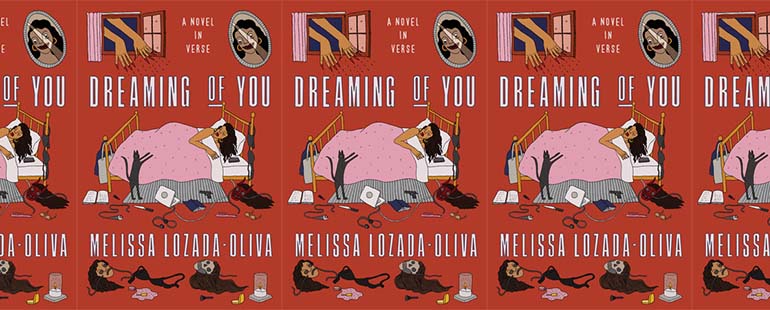Death, Rebirth, and Selfhood in Dreaming of You

Dreaming of You
Melissa Lozada-Oliva
Astra House | Oct 26, 2021
Guatelombian poet, screenwriter, and multi-medium artist Melissa Lozada-Oliva’s debut novel, Dreaming of You, is a beautiful confluence of verse and prose. In it, a Latina poet, also named Melissa, brings Tejano pop star Selena Quintanilla back to life through a séance. This uncanny version of Selena confronts the protagonist with the figment of her personal and cultural obsessions: from the beauty of Selena she’s tried to emulate with her friends, to the idea of how she should act around a boyfriend, and the fear of violence against women’s bodies that later withdraws her from intimacy. Organized into a four-act play, Dreaming of You pushes the limits of its verse-prose hybrid narrative form to explore the complexity of modern, generational immigrant identity of Latina women.
The novel opens with its cast of characters described by narrator/protagonist Melissa in a hyper-aware, self-reflexive voice that judges everyone, including herself. With Melissa’s narration comes a Greek chorus of chismosas—a crew of gossip girls—who upend her narrative—telling “truth” and talking “shit” about how Melissa should know the difference between love and being adored by others, the distance which Melissa struggles to reconcile throughout Dreaming. From the onset, the chismosas note, “This is a story of mirrors . . . you look in it you see yourself / eating yourself.” Melissa is part of something bigger, in constant flux. Like the ancient Egyptian and later Greek Ouroboros, a serpent figure that eats itself in a cycle of birth, life, and death, Melissa’s image will experience a rebirth but must first suffer its own death.
The chismosas warn of what’s to come, but Melissa doesn’t listen. Her journey begins with self-obsession, turning the dials of her image to the right channel of how she wants to be seen. When she thinks of sleeping with her boyfriend, she listens to Selena’s cross-over English hit “Dreaming of You.” She writes her own lyrics, “what is better than me / and my imagination? What is more loving / than of all the ways I can invent You / touching me?” An elliptical sense of the song’s lyrics moves through Melissa—Selena singing about lying in bed, dreaming of her beloved—yet comes out slightly refracted and personalized, pieces of herself embedded in Selena’s world and vice versa. Here, Melissa finds pleasure in being as similar to Selena as possible. “It’s like I can see her,” she says, and later, “it’s not enough to be seen. / Because I need to see.” Melissa’s imagination gets her only so far. She wants to come closer to Selena’s reflection, to resurrect her.
This resurrection starts with Melissa and her friends fighting after they all dressed up as Selena for Halloween (who should be allowed to wear her?). The ultimate act comes with the séance that thrusts Selena back, not only to Melissa but into the real world. But her return comes at a cost. The chismosas note at a dead celebrity party, a soiree that includes Jimi Hendrix and Michael Jackson, “Could it be that the realer Selena / becomes [in her resurrection], the more Melissa disappears?” The possession, the image incarnate of the Tejano popstar, begins to consume Melissa. Indeed, her influence consumes the protagonist until she disappears, and another narrator takes her place—Yolanda Saldívar, Selena’s murderer. Like the Ouroboros, death follows birth.
In this alternate reality, Yolanda escapes from prison. She wants another chance at her story just as Selena has gotten one and takes the authorial “I” away from Melissa when she rips Melissa’s skin off her to wear. “My skin falls at my feet / I am pulsing and red and then invisible / Yolanda runs away with my flesh husk. I watch my face / bounce against her hip.” This complex of Latina women (Selena, Yolanda, Melissa, and her friends) chase versions of Selena but also of themselves. From the Halloween costumes Melissa and her friends fashion as a second skin, to Yolanda’s violent takeover, to the dolls, TV shows, and interviews that Selena puts out during her second life, these uncanny instances convey small deaths of the self that, though set for wider pop consumption, sacrifice, bit by bit, the identities of these women, too.
These sacrifices often come by violent means. There’s self-inflicted violence and women hurting each other, but the most severe brutality comes from Melissa’s fear of men hurting women. When she dates, she puts one face on to flirt while inside she carries out an entire dialogue with herself on the worst-case scenarios. They imply her inner monologue: “[Locked in an attic dressed up as a doll with a bowl of water and a plate / of food at my feet . . . Chopped up into little pieces and dispersed into the ocean, little fishes / feeding on my hands].” And later, she remembers Selena’s funeral. “It’s very easy to picture myself / inside / every white van I walk by . . . I can see myself crying over a body but also being the body.” Melissa’s dread of violence seems less metaphor here and more true-crime. The imagery that flashes in her thoughts ring true and avoid the metafiction that drives most of the novel.
The trials Melissa faces throughout Dreaming of You are not only how to survive the potential violence and the consequences of her bringing Selena back to life, but how to build herself from within without only reflecting others. The quest seems irreducible at times because she can’t rid herself of her love for Selena and her music. But the questions Lozada-Oliva’s book presents are poignant: Is it possible to be part of a tribe without losing the self? And can this tribe be recollected into an American geography without losing the heritage of the Central and South American diasporas it comes from? Dreaming of You brilliantly challenges the limits of one’s selfhood and reveals what’s lost when it’s contorted to fit the beholder’s gaze.


